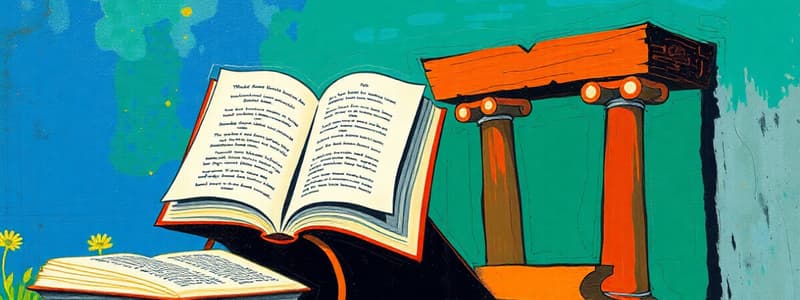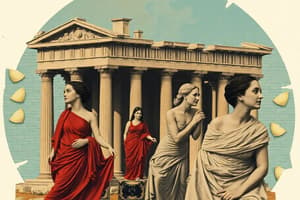Podcast
Questions and Answers
Why were Ancient Greek and Latin literature traditionally combined into a single Classics department in universities?
Why were Ancient Greek and Latin literature traditionally combined into a single Classics department in universities?
- Because the study of language was deemed less important than the study of literature.
- Due to their historical development of being a single tradition with shared forms and subjects. (correct)
- To reduce administrative overhead and departmental budgets.
- Because Greek and Latin were always taught by the same professors.
What does the term 'syncretism' refer to in the context of Roman and Greek religion?
What does the term 'syncretism' refer to in the context of Roman and Greek religion?
- The assimilation or merging of different religions. (correct)
- The rejection of foreign religious practices in favor of native traditions.
- The strict separation of religious and state affairs.
- The violent suppression of minority religious groups.
What is considered an innovation of Roman literature in relation to Greek literature?
What is considered an innovation of Roman literature in relation to Greek literature?
- The adaptation of Greek literary forms into the vernacular language. (correct)
- The strict adherence to the original Greek literary styles and themes.
- The complete rejection of Greek literary influence in favor of original Roman works.
- The invention of new mythological figures and stories.
What does 'reception studies' primarily focus on in literature?
What does 'reception studies' primarily focus on in literature?
Which of the following is true regarding the spelling of the Roman author's name, Virgil?
Which of the following is true regarding the spelling of the Roman author's name, Virgil?
What was Virgil's writing process for the Aeneid?
What was Virgil's writing process for the Aeneid?
What event in Book 1 of the Aeneid sets the poem's plot into motion?
What event in Book 1 of the Aeneid sets the poem's plot into motion?
In the Aeneid, what does Dido's curse foretell?
In the Aeneid, what does Dido's curse foretell?
What episode in the Aeneid mirrors a similar event in Homer's Iliad?
What episode in the Aeneid mirrors a similar event in Homer's Iliad?
In the Aeneid, what motivates Aeneas to kill Turnus, despite Turnus' surrender?
In the Aeneid, what motivates Aeneas to kill Turnus, despite Turnus' surrender?
Who was Pyrrhus of Epirus and what was his significance in the context of early Roman history and mythology?
Who was Pyrrhus of Epirus and what was his significance in the context of early Roman history and mythology?
Before the Romans embraced it, how was the story of their Trojan origins initially used?
Before the Romans embraced it, how was the story of their Trojan origins initially used?
In Roman mythology, how were the stories of Aeneas and Romulus reconciled?
In Roman mythology, how were the stories of Aeneas and Romulus reconciled?
What does the combination of the old German department with other departments at Western suggest about the state of language studies?
What does the combination of the old German department with other departments at Western suggest about the state of language studies?
Why might studying Seneca's Hercules be valuable, even if Euripides' Herakles is an older Greek source?
Why might studying Seneca's Hercules be valuable, even if Euripides' Herakles is an older Greek source?
What is the significance of vernacular literature, as discussed in the context of the Aeneid?
What is the significance of vernacular literature, as discussed in the context of the Aeneid?
What does the example of Phrynichus' play, The Capture of Miletus, illustrate about literary reception?
What does the example of Phrynichus' play, The Capture of Miletus, illustrate about literary reception?
Why is it important to consider the historical impact of orientalism when studying Homer's Iliad?
Why is it important to consider the historical impact of orientalism when studying Homer's Iliad?
What are the typical components of a Roman name, using Virgil (Publius Vergilius Maro) as an example?
What are the typical components of a Roman name, using Virgil (Publius Vergilius Maro) as an example?
Which of Virgil's three major works consists of short poems in dactylic hexameter describing the lives of fictional shepherds?
Which of Virgil's three major works consists of short poems in dactylic hexameter describing the lives of fictional shepherds?
What historical context is important for understanding Virgil's Eclogues?
What historical context is important for understanding Virgil's Eclogues?
What is the subject of Virgil's Georgics?
What is the subject of Virgil's Georgics?
What is the significance of the half lines scattered throughout the Aeneid?
What is the significance of the half lines scattered throughout the Aeneid?
What is Aeneas's ultimate destination, as prophesied and ordained by fate, in the Aeneid?
What is Aeneas's ultimate destination, as prophesied and ordained by fate, in the Aeneid?
What prompts Juno's animosity towards Aeneas and the Trojans in the Aeneid?
What prompts Juno's animosity towards Aeneas and the Trojans in the Aeneid?
In Book 8 of the Aeneid, who provides Aeneas with new armor and a shield, and what is the significance of this event?
In Book 8 of the Aeneid, who provides Aeneas with new armor and a shield, and what is the significance of this event?
What leads to the outbreak of war between the Trojans and the Italians in the Aeneid?
What leads to the outbreak of war between the Trojans and the Italians in the Aeneid?
What is the significance of Camilla in the Aeneid?
What is the significance of Camilla in the Aeneid?
Flashcards
Syncretism
Syncretism
The assimilation or merging of two religions.
Vernacular Literature Adaptation
Vernacular Literature Adaptation
Adapting literary forms of one culture into the vernacular of another; a Roman innovation.
Creative Imitation
Creative Imitation
A type of literary engagement where texts imitate and build upon previous works.
Literary Reception
Literary Reception
Signup and view all the flashcards
Reception Studies
Reception Studies
Signup and view all the flashcards
Vergilius/Virgil
Vergilius/Virgil
Signup and view all the flashcards
Eclogues (Bucolics)
Eclogues (Bucolics)
Signup and view all the flashcards
Georgics
Georgics
Signup and view all the flashcards
The Aeneid
The Aeneid
Signup and view all the flashcards
Dido
Dido
Signup and view all the flashcards
Aeolus
Aeolus
Signup and view all the flashcards
Anchises
Anchises
Signup and view all the flashcards
Latinus
Latinus
Signup and view all the flashcards
Evander
Evander
Signup and view all the flashcards
Pallas
Pallas
Signup and view all the flashcards
Turnus
Turnus
Signup and view all the flashcards
Aeneas
Aeneas
Signup and view all the flashcards
Romulus and Remus
Romulus and Remus
Signup and view all the flashcards
Study Notes
History of Classical Studies
- Language matters more in university literature studies than in school.
- In high school, English and literature are combined.
- At university, literature study is divided by language.
- Studying a writer like Kafka necessitates learning German.
- Studying Homer requires learning Ancient Greek in the Classics Department.
- Studying Classical literature in translation was possible but still in the Classics Department
- The German Department focuses on literature in German, similar to the English Department's focus on literature in English.
- Reduced language study has caused some departments to combine at certain institutions.
- The Department of Classical Studies has consistently existed.
- Greek and Latin have always been combined into Classics
- Both contribute to a single tradition through shared forms and subjects.
- Roman sources provide information on Greek mythology.
- Greek sources complete Roman mythology.
- Understanding the Aeneid requires Homeric knowledge.
- Interpretation of Homer includes understanding the "Aeneid," an expansion of the Homeric universe.
Syncretism
- Roman and Greek religions share similarities through shared origins and Greek cultural influence.
- Syncretism Definition: The assimilation or merging of two or more religions.
- Romans adopted Greek literary forms and stories in the third century BCE.
- Roman Mythology largely adopts stories from Greek mythology
- Differences exist, such as varying emphasis linked to cultural context.
- Both Euripides and Seneca rewrote old myths for new times
- Homer adapts even older myths from east of the Aegean, like the story of Gilgamesh
Creative Imitation
- The same story differs across cultural and historical contexts.
- The biggest difference between the Greek Heracles and the Roman Hercules is that different parts of the story will speak more powerfully in a new context.
- Roman innovation lies in adapting foreign literary forms into the vernacular.
- Vernacular literature enabled widespread literacy and creation of the modern world
- Vernacular languages help to create widespread literacy
- Creative imitation occurs in all literature.
- People learn and develop identity through imitation.
- Literary reception, how an audience receives a text, is vital.
- Understanding an audience's reaction is more important than what the writer is trying to do with it
- The Iliad's meaning evolved for Greeks after the Persian Wars.
- Homeric myth and tragedies helped interpret Athenian culture after the Persian Wars.
- Reception studies analyze how works are received across time and place.
Virgil
- Full name: Publius Vergilius Maro.
- Romans had at least a first name and a family name
- Cognomen: A third name indicating a branch of the family
- Born near Mantua, Italy, on October 15, 70 BCE; died at Brundisium, Italy, on September 21, 19 BCE.
- Three major works: Eclogues (Bucolics), Georgics, Aeneid.
- Wrote poems between 42 and 39 BCE that describe fictional Shepards in an idyllic landscape
- Wrote a poem in four books of dactylic hexameter about farming.
- Between 29 BCE and 19 BCE, he composed an epic in twelve books.
The "Aeneid"
- Author: Publius Vergilius Maro (Virgil).
- Written between 29 and 19 BCE; unfinished at Virgil's death.
- Virgil wrote the epic in prose before converting it to verse.
- Incomplete lines exist due to Virgil's process.
- On his deathbed, Virgil wanted the manuscript destroyed, but Emperor Augustus had it published.
- Author spent time in and around Rome, and at his family farm in Mantua.
- Originally written in Latin.
Synopsis: Books 1-6
- Book 1: Juno stirs a storm, sending Aeneas to Carthage.
- Aeneas meets Queen Dido in Carthage, who welcomes the Trojans.
- Book 2: Aeneas recounts the fall of Troy.
- Book 3: Aeneas tells of his travels with the refugees.
- Book 4: Aeneas and Dido fall in love.
- Hermes reminds Aeneas of his mission, leading to Dido's suicide and curse.
- Book 5: Aeneas holds funeral games for Anchises in Sicily, modeled after the funeral of Patroclus.
- Book 6: Aeneas visits the Sibyl and tours the underworld with Anchises, who shows him future Romans.
Synopsis: Books 7-12
- Book 7: Aeneas agrees to marry Lavinia, causing war between Trojans and Italians.
- Book 8: Aeneas gains allies, including Pallas; Venus provides new armor.
- Book 9: Nisus and Euryalus die during a mission to reach Aeneas.
- Book 10: Aeneas returns, Turnus kills Pallas, and Aeneas rages, killing Mezentius and Lausus.
- Book 11: Camilla dies in battle.
- Book 12: Aeneas defeats and kills Turnus after seeing Pallas' sword belt.
Origin of the Legend of Aeneas
- Tarentum enlisted Pyrrhus of Epirus to resist Roman conquest in 280 BCE.
- Pyrrhus' coin is the first evidence of the Trojan origin of Rome theory.
- Origin of Rome: Romulus and Remus, sons of Mars, raised by a wolf, Romulus killed Remus and named Rome.
- Pyrrhus, claiming descent from Achilles, vowed to defeat the Trojan-descended Romans.
- Integration of Romans into Greek mythology positioned them in the Mediterranean world.
Aeneas and Mythology
- Aeneas: Came to Italy and founded Lavinium
- Aeneas' son Iulus/Ascanius: Founded Alba Longa
- In Alba Longa, the Trojans lived for centuries, until Romulus and Remus
- Virgil wrote the story of Aeneas, his journey from Troy to Italy, his war against the Italians
Studying That Suits You
Use AI to generate personalized quizzes and flashcards to suit your learning preferences.




